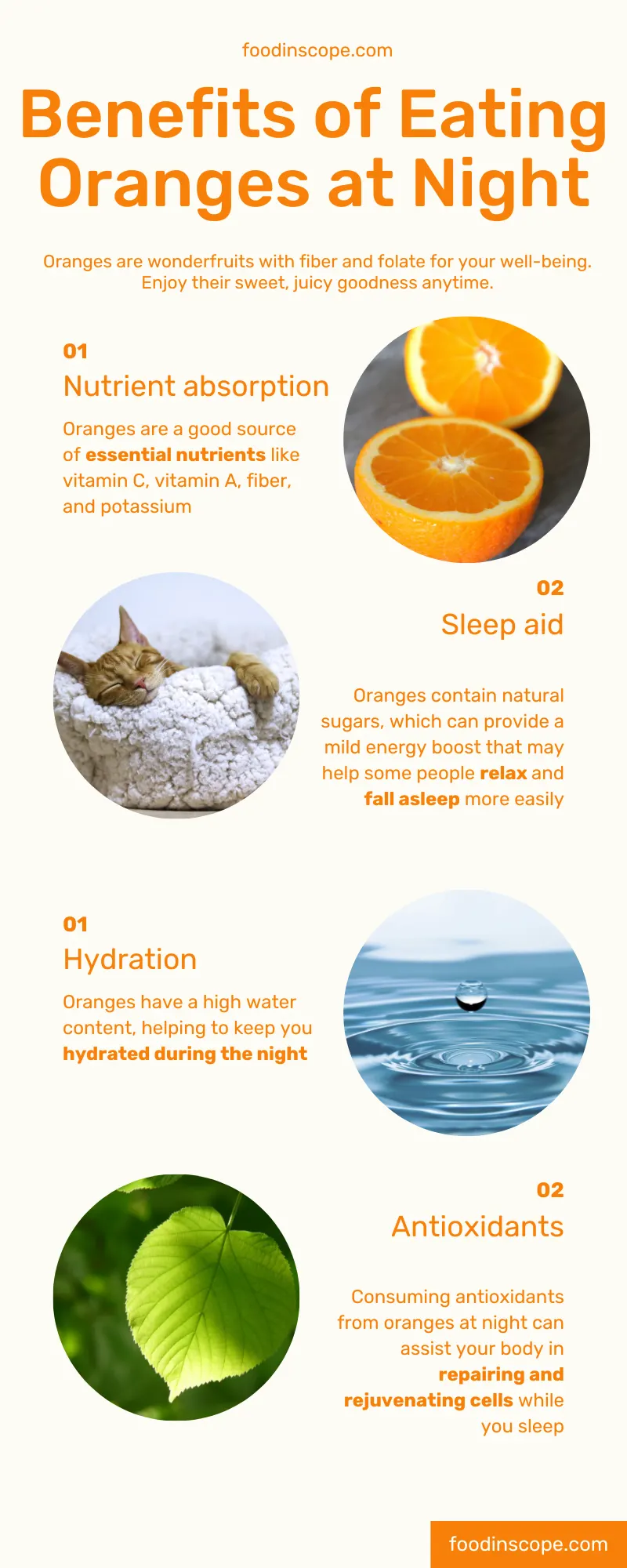Benefits Of Eating Oranges At Night For Weight Loss
Eating orange before bed is beneficial for weight loss since it increases metabolism and fat burning thanks to Vitamin C, which is present in citrus fruits. Having this citrus before bed is an interesting way to shake off excess weight.
Studies have shown that orange juice consumption is associated with better diet quality, improved nutrient adequacy, decreased risk for obesity, and improved biomarkers of health in adults. (source)

Benefits of Eating Orange at Night

To answer the question is orange good for weight loss at night, we grouped together a list of benefits of eating orange at night:
- Nutrient absorption: Your body can efficiently absorb the nutrients from oranges during nighttime, as your metabolism is still active while you sleep.
- Satiety: Oranges can provide a feeling of fullness, which can help prevent late-night snacking on less healthy options.
- Hydration: Oranges have a high water content, helping to keep you hydrated during the night.
- Antioxidants: Consuming antioxidants from oranges at night can assist your body in repairing and rejuvenating cells while you sleep.
- Digestion: The fiber in oranges can support digestive health, reducing the likelihood of discomfort or digestive issues during the night.
- Sleep aid: Oranges contain natural sugars, which can provide a mild energy boost that may help some people relax and fall asleep more easily.
Set of Healthy Components in Orange
Apart from Vitamin C, orange juice contains folate which is important for DNA metabolism and cell growth, and potassium is essential for nerve and muscle function.
Orange juice also contains beneficial plant compounds such as hesperidin, which may reduce inflammation and improve cardiovascular health.
Orange juice is an easy and convenient way to get a variety of vitamins and minerals, may aid in weight management, and can be a part of a healthy and balanced diet.
In details about orange micronutrients and vitamins

Additionally, it is a good source of dietary fiber and essential vitamins like thiamin, riboflavin, and folate, which boost energy levels and help you feel fuller for longer periods of time.
Eating oranges before bed may also help you sleep better since Vitamin C helps reduce stress hormones like cortisol and norepinephrine.
Another reason why citrus before bed can promote weight loss
Furthermore, eating an orange before bed can help promote weight loss due to its high water and fiber content.
This can help reduce hunger and keep you feeling fuller for longer.
The nutrient-dense properties of oranges can provide essential vitamins and minerals to promote overall health, meaning improved energy and better functioning of your metabolism.
Orange for reducing fat accumulation
Research has shown that incorporating oranges into your day-to-day diet can help reduce fat accumulation in the body, which is essential for weight loss.
Eating oranges before bed can also help prevent snacking late at night, which is a contributor to weight gain. Furthermore, eating oranges at night time can help boost your metabolic rate and promote the burning of stored fat, resulting in further weight loss.
All in all, incorporating oranges into your daily diet can help with weight loss and support overall health.
Frequently Asked Questions
Can I eat orange at night for weight loss
Certainly, eating oranges at night can be beneficial for weight loss. Oranges are a low-calorie and nutritious snack option that can help satisfy your hunger while providing essential vitamins, minerals, and fiber. The fiber in oranges can promote a feeling of fullness, potentially preventing overeating of less healthy snacks late at night. Additionally, the hydration provided by oranges can aid in proper metabolism and digestion, both of which are important for managing weight.
Is orange juice good for weight loss at night
Orange juice at night, particularly for weight loss, may not be ideal due to its potential to cause bloating and gassiness, especially in those sensitive to FODMAPs (fermentable oligosaccharides, disaccharides, monosaccharides, and polyols). FODMAPs like fructose in orange juice can lead to digestive discomfort. Whole oranges, with less fructose and more fiber, are a better option for weight management and reducing the risk of bloating and gas in sensitive individuals.
Is orange good before bed
Certainly, consuming oranges before bed can be a beneficial choice. They offer hydration, essential nutrients like vitamin C, vitamin A, and potassium, and dietary fiber. The advantage of choosing oranges as a bedtime snack is that they provide these benefits without feeling overly heavy on the stomach, making them a light and refreshing option. The hydration from oranges can help prevent nighttime dehydration, and the natural sugars in oranges may provide a subtle energy boost for some individuals, which can aid in relaxation and falling asleep. However, it’s essential to consume them in moderation to avoid overeating before bedtime.
Summary
✓ Eating oranges at night time can help promote weight loss due to its high water and fiber content.
✓ Orange juice is a good source of dietary fiber and essential vitamins like thiamin, riboflavin, and folate which boost energy levels and make you feel fuller for longer periods of time.
✓ The nutrient-dense properties of oranges can provide essential vitamins and minerals to promote overall health.
Research sources
- Bioactive compounds, antioxidant activity and fruit quality evaluation of eleven blood orange cultivars
- Effects of Citrus Fruit Juices and Their Bioactive Components on Inflammation and Immunity: A Narrative Review
- Red Orange: Experimental Models and Epidemiological Evidence of Its Benefits on Human Health
- Health outcomes of 100% orange juice and orange flavored beverage: A comparative analysis of gut microbiota and metabolomics in rats

